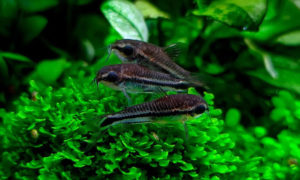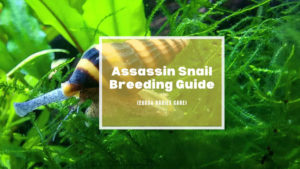Mystery snails are one the most popular algae-eating creatures out there. As such, they are a must-have for aquarists to tackle the growth of algae.
Furthermore, they come in various colors, including ivory, gold, blue, and black, making them an excellent choice for enhancing the visual appearance of any aquarium. And the best part is that they are very peaceful species.
Now, aquarists owning mystery snails often wonder: how long do mystery snails live? And that is why we have curated this guide to tell you everything about the lifespan of mystery snails.
So, let’s jump right in!
How Long Do Mystery Snails Live In Captivity?
If taken care of properly, mystery snails can live up to 2 years in captivity. A 5-gallon tank is a minimum for one mystery snail to thrive. And, if you have multiple snails, we’d suggest getting a bigger tank.
Furthermore, ensure that the tank is clean and set somewhere between 70 and 80 degrees Fahrenheit. Since mystery snails are delicate creatures, they won’t survive harsh temperatures.
Also, make sure that you control the concentration of nitrates, nitrites, and ammonia in the water, as mystery snails are very sensitive to all three compounds.
How Long Do Mystery Snails Live In The Wild?
Mystery snails are always at the risk of getting attacked by predators, which include crayfish, betta fish, waterfowl, etc. As a result, their natural lifespan gets affected by a few months or even a year. So, the lifespan of a mystery snail in the wild mostly depends on the habitat that they are in. But any snail would have to be lucky to survive over a year.
How To Increase Your Mystery Snail’s Lifespan?
Temperature
You have to ensure that the temperature in the tank is maintained optimally. Even though mystery snails can survive both higher and lower temperatures, it’s best to keep the water conditions between 70 and 80 degrees Fahrenheit.
If your house has a temperature around this range throughout the year, you might not require a heater. However, keep in mind that mystery snails don’t like sudden shifts in temperature, so we suggest getting a heater regardless.
Go for a heater that operates at 5 watts per gallon, meaning if you have a 5-gallon tank, you would require a 25-gallon heater.
Food
Mystery snails do not feed off live plants, they mainly depend on decaying and dead plant matter when it comes to food. When your plants begin to rot or lose leaves, mystery snails will feed off them and help in keeping the aquarium clean. However, an average home aquarium cannot produce enough waste to provide mystery snails with uninterrupted access to food.
For this reason, you will also have to feed them:
- Veggie wafers
- Cucumber
- Broccoli
- Zucchini
- Lettuce
- Spinach
Feed your mystery nails at least thrice a week. Ensure that you remove the uneaten food after a day or two; otherwise, it will start rotting and spoil the water quality. When mystery snails are fed properly, they grow in size, which in turn may increase their lifespan.
Water Conditions
As far as water condition is considered, it’s important to maintain an optimal ph range for mystery snails to survive. If the water has a low pH level, it can cause the snails’ shells to wear down.
To keep the snails healthy, make sure that the pH level is above 7. We would highly suggest you invest in a quality pH testing kit to keep track.
Apart from this, mystery snails love floating materials to travel on, so adding driftwoods and rocks would be a good idea.
Tank Mates
Mystery snails are quiet, calm creatures that do well with freshwater fishes and invertebrates. But, they shouldn’t be kept in a tank with large or nippy fishes. The snails’ tentacles look much like a worm, which makes them a target for nippy and aggressive fishes.
Even though the shells protect them, big fishes like cichlids and gold fishes can do them major harm. As such, you should never house your mystery snails with them.
FAQs
How long can a mystery snail survive out of water?
A mystery snail can survive without water for up to 5 days. However, it mainly depends on the age and the size of the snail. The larger the snail, the longer it can survive without water. When a snail is out of the water, it enters into a hibernation-like state by slowing down metabolism, which plays a crucial role in its survival.
My snail is out of its shell. Will it survive?
No, a snail can never survive without its shell; it will die very shortly due to lack of moisture.
How long can a mystery snail live without food?
The snail’s activity and the temperature of the tank plays a major part in deciding how long it can survive without food. In general, it’s usually not more than 5 days.
How long can mystery snails live in a bag?
It mainly depends on the temperature of the bag the snails are in, their size, and age. If the bag hasn’t experienced freezing temperatures, you can expect them to live for up to 10 days. That said, if your snails are mature, they can live for several weeks by going into hibernation.
Final Thoughts
That brings us to the end of this article; hopefully, it has helped you gain valuable insights into the average lifespan of mystery snails.
Like most other creatures, the lifespan of mystery snails mostly depends on environmental factors and the food they are being fed. So, ensure that you follow the tips mentioned above to maintain optimal living conditions for your mystery snails.
In that way, you might be able to make them live for up to 2 years. On that note, it’s a wrap. See you soon.





